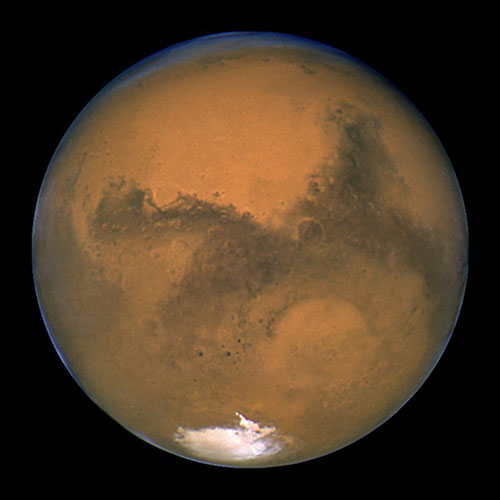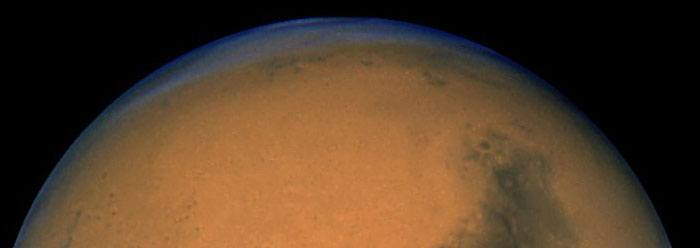Reporting on its successful landing in August 2012, The New York Times wrote that Curiosity "could turn up evidence that the Red Planet once had the necessary ingredients for life—or might even still harbor life today."2 If Mars ever had life, it would have needed a much thicker atmosphere.
 As
far as researchers know, only earth has the many factors
required to sustain life, including an atmosphere thick with
nitrogen and oxygen. Its peculiar ratios of life-supporting
gases are maintained by the very living things that it
sustains.3,4 And other vital factors, like
atmospheric pressure and temperature, require the earth's
size, mass, and position and motion in space, as well as its
moon and the strength of its magnetic field. Mars does not
have these factors.5
As
far as researchers know, only earth has the many factors
required to sustain life, including an atmosphere thick with
nitrogen and oxygen. Its peculiar ratios of life-supporting
gases are maintained by the very living things that it
sustains.3,4 And other vital factors, like
atmospheric pressure and temperature, require the earth's
size, mass, and position and motion in space, as well as its
moon and the strength of its magnetic field. Mars does not
have these factors.5
To sustain life, Mars would need a thicker atmosphere and liquid water, alongside many other parameters. Scientists have long recognized that Mars' surface has been catastrophically scoured by some liquid.6 If that liquid was water—perhaps consistent with the observation of polar ice—it likely vaporized very quickly due to the planet's low atmospheric pressure.
NASA released the results of Curiosity's sophisticated scan of Mars' atmospheric gases, which used "the most sensitive measurements ever to search for methane gas on Mars." Why methane? Because it " is of interest as a simple precursor chemical for life."1 However, methane on Mars would not indicate microbes, since geochemical processes can produce methane.7 Intense solar radiation on the freezing, sterile Martian surface quickly converts methane into carbon dioxide.8
"Learning what happened to the Martian atmosphere will help scientists assess whether the planet ever was habitable," according to NASA. What is so important about Mars' habitability?
Life found anywhere but earth would bolster belief in evolution. The fact that life is only on earth is vexing to evolutionists, whose philosophy predicts abundant alien life. SETI director Jill Tarter told Reuters, "As soon as we find a different, a separate, an independent example of life somewhere else, we're going to know that it's ubiquitous throughout the universe."9 And if life evolved throughout the universe, then the Bible would be wrong about life being created by God on earth.
Space scientists once searched for life on Mars. When that did not pan out, they searched for conditions for life on Mars.10 Failing that, they now search for possible ancient conditions for life on Mars, like whiffs of methane.
Did Curiosity find methane on Mars? Chris Webster of NASA's Jet Propulsion Laboratory in Pasadena, California said, "Methane is clearly not an abundant gas at the Gale Crater site [where Curiosity landed], if it is there at all."1 Though certainly a technical achievement and a colossal expense, Curiosity found no methane, no liquid water, and nothing remotely friendly to life, either in its current atmosphere or in any imaginary past atmosphere.
References
- NASA Rover Finds Clues to Changes in Mars' Atmosphere. Jet Propulsion Laboratory press release, November 2, 2012.
- Chang, K. Curiosity Rover Lands Safely on Mars. The New York Times. Posted on nytimes.com August 6, 2012, accessed November 6, 2012.
- Thomas, B. A Natural Cause of Greenhouse Gas. Creation Science Update. Posted on icr.org July 16, 2008, accessed November 6, 2012.
- Thomas, B. Does Earth Balance Carbon Dioxide Levels Automatically? Posted on icr.org January 12, 2009, accessed November 6, 2012.
- Coppedge, D. 2009. Atmospheres: A Narrow Zone for Life. Acts & Facts. 38 (8): 18.
- Thomas, B. Mars 'Water-carved' Canyon Actually Etched by Lava. Creation Science Update. Posed on icr.org April 16, 2010, accessed November 7, 2012.
- Thomas, B. Methane on Mars: The Stuff of Life? Creation Science Update. Posted on icr.org January 19, 2009, accessed November 7, 2012.
- Thomas, B. Mars Even More Hostile to Life Than Previously Thought. Creation Science Update. Posted on icr.org June 18, 2010, accessed November 7, 2012.
- Klotz, I. Planet found orbiting habitable zone of sun-like star. Reuters, December 5, 2011.
- Thomas, B. 2008. Searching for the Elusive Man from Mars. Acts & Facts. 37 (7): 14.
Image credit: NASA
* Mr. Thomas is Science Writer at the Institute for Creation Research.
